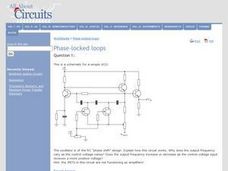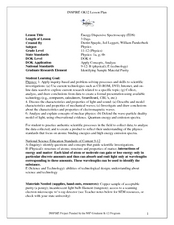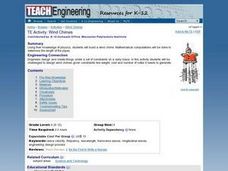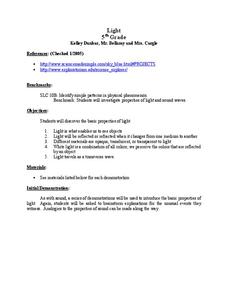Curated OER
Phase-locked Loops
In this physics instructional activity, students examine how phase-locked loop circuits works and answer 8 short answer questions about it. They explain how FM radio communication works.
Curated OER
Applied Science -Physics (2B) Pre Lab
Second graders look at different types of energy. In this energy lesson, 2nd graders define energy and the difference between kinetic and potential energy. They see examples with falling books and a slinky.
Curated OER
Energy At Play
If you can find Tinker Toys™, then this may be a fun assignment for your physical science class. Using the construction set and a few other toys, they examine the forces involved when it they are being played with. For each, they...
Washington State University
Defining Bullying
How can you recognize bullying? How is verbal bullying different from physical or social bullying, and when has a joke gone too far? Learners use their own experiences and ideas to inform the discussion.
Science Friday
Microorganisms on the Move
You can't b. cereus until you see this lesson! Young microbiologists learn to prepare deep well slides, observe two types of microorganisms, and compare and contrast their physical characteristics in this interactive and lively activity.
Curated OER
The Old Man and the Sea: Guided Imagery
What do you imagine when you think of the sea? Put on some ocean sounds, close your eyes, and listen to a guided meditation based on the imagery from The Old Man and the Sea by Ernest Hemingway. After class members listen to the...
Curated OER
Investigation of Timbre
Students design an experiment to analyze the timbre of different instruments. In this physics lesson, students analyze the missing quality in sound. They discuss their results in class.
Curated OER
Electromagnetic Spectrum
Students define electromagnetic radiation, list major categories and uses of electromagnetic waves, identify potential health risks with electromagnetic waves, and demonstrate understanding of Plank's constant by solving quantitative...
Curated OER
What Shape Is It?
Students predict the shape of an unknown object by bouncing a ball on it. For this physics lesson, students relate this activity to how dolphins use echo-location to navigate. They analyze their lab result and discuss findings.
Curated OER
Energy: Classroom Energy Hunt
Sixth graders list the different forms of energy. In this physics activity, 6th graders identify what form of energy a certain object possess. They explain the law of conservation of energy.
Curated OER
Energy Dispersive Spectroscopy
Students calculate the values of electron binding energies. In this physics instructional activity, students solve for different wavelength characteristics of X-rays. They present their findings to the class.
Curated OER
Investigation of Hooke's Law Lab
Learners determine the spring constant by conducting an investigation. In this physics lesson plan, students collect data and create a graph of force vs. displacement. They compare the results of two different methods to find spring...
Curated OER
The Space Cadet's Laboratory: Using Electromagnetic Energy to Study Astronomy
Students build their own spectrophotometer to study light. In this physics lesson plan, students explain the dual nature of light. They calculate the angle of incidence and refraction using Snell's law equation.
Curated OER
Wind Chimes
Students construct wind chimes using physics. In small groups they design and create wind chimes using a specific weights, number of notes, and keeping the cost under ten dollars.
Curated OER
Life of Thomas Edison
Students research the life of Thomas Edison. In this Thomas Edison instructional activity, students explore major life events of Thomas Edison. Students investigate the inventions of Thomas Edison. Students discover how various fields...
Curated OER
The Speed of Galaxy Q2125-431
In this speed of a galaxy instructional activity, students use a given equation for the speed of an object and they use the spectral lines for Hydrogen Alpha and Beta from the Seyfert galaxy to answer 6 questions. They determine the...
Curated OER
The Cigar Box Guitar
Students correlate string tension with sound pitch. They describe how string mass (thickness) effects sound pitch and demonstrate an understanding of the physics of the acoustic guitar. They see that sound is produced by vibrations.
Curated OER
Probes, Exploration and Application
Students examine the benefits of the space program to our life on earth. In this space exploration lesson students participate in a lab, answer questions and study radar mapping.
Benjamin Franklin High School
Saxon Math: Algebra 2 (Section 9)
Section 9 of the 12 linked Saxon Math sections introduces the young algebrist to graphing periodic functions, creating graphs from quadratic roots, working with inequalities, and rational equations. Common among all the lessons is the...
Curated OER
Tune Up Your Ears!
Learners discuss meaning of pitch, listen for different sounds in classroom, hallway, and outdoors, and listen to sounds played on piano and on computer to determine high or low pitch.
Curated OER
Let the Sunshine in
Students collect and analyze data to study wavelengths of visible light. They cover Styrofoam cups with three different colors of sun filtering products and shine a lamp directly on the cups. They determine the most effective filtering...
Curated OER
Force and Motion
Each of the slides here gives a definition, equation, or calculation example for a component of force and motion. This large collection covers topics from momentum and Newton's laws to centripetal forces and simple machines. Animations...
Curated OER
Light
Fifth graders sit in their seats with the lights on and then the teacher turns off the lights. After their eyes have adjusted, they vote on what colors of construction paper are being held up. The lights are then turned back on and...
Curated OER
Automated Vehicle Programming Design
Students design a program to make an automated vehicle perform a specific task. In this robotics lesson, students play the role of scientists competing to win a factory's contract. They present their algorithm to class.

























